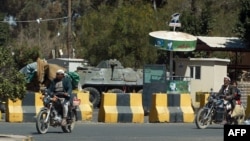Yemen's Houthi movement has freed the presidential chief of staff, whom it seized January 17 during a power struggle with then-President Abd Rabbuh Mansour Hadi, and the rebels' leader has called for a peaceful transfer of power in the capital, Sanaa.
In an appearance on the rebels' television station, Abdel-Malek al-Houthi said he invited all "free and honorable people" to what he called a "large, inclusive and historic" meeting Friday in Sanaa. He said he was taking a stand against anarchists and those who would rather fight and argue instead of cooperate.
The seizure of the aide, Ahmed Awad bin Mubarak, helped to plunge Yemen into political crisis, resulting in clashes between the Houthis and Hadi's presidential guards that prompted the president and the government to resign.
Houthi official Ali al-Quhoom said bin Mubarak was freed without any restrictions or conditions as a goodwill gesture to ease tensions in Yemen and in honor of a delegation of tribal leaders from the Shabwa province in southeastern Yemen, where the Hadi aide comes from.
“Bin Mubarak has just been handed over" to a tribal leader, Quhoom told Reuters by telephone.
The Houthis had also threatened unspecified further steps after Hadi laid out a new draft constitution that would devolve authority to regions, in an attempt to resolve regional, political and sectarian differences in Yemen.
The Houthis quickly rejected the draft, saying it paved the way for dividing the country and obstructing a power-sharing agreement they signed when they captured Sanaa in September.
Hadi and the rest of his government resigned Thursday in exasperation at the Houthi takeover of much of the country.
The Houthi rebels emerged as the dominant group among those who have wrestled for power since a 2012 popular uprising toppled longtime leader Ali Abdullah Saleh.
Now, the Houthis and other groups in Yemen are trying to agree on what to do in the wake of Hadi's resignation. The Houthis have proposed forming a presidential council of representatives of various political parties. Other parties are trying to persuade Hadi to retract his resignation before they agree to any new arrangement.
Some information for this report came from Reuters.





